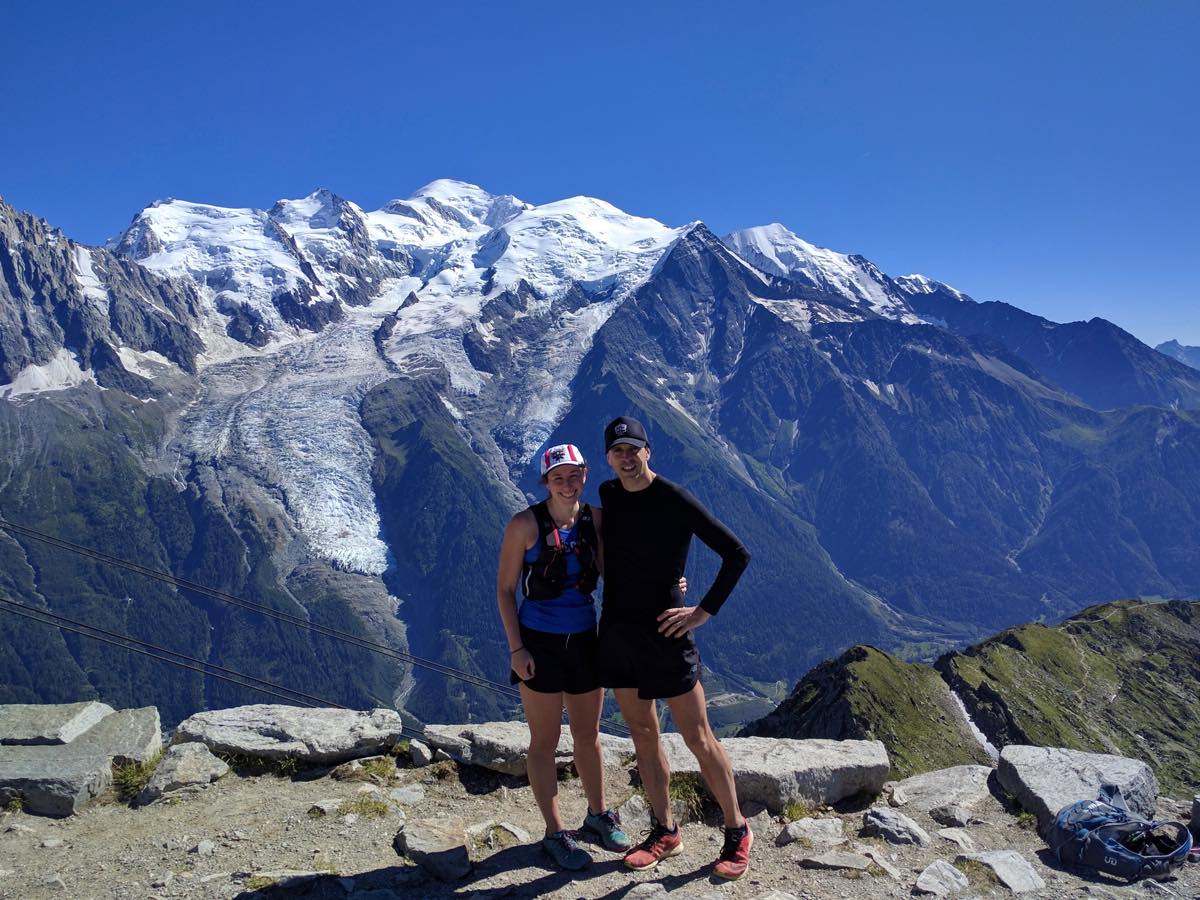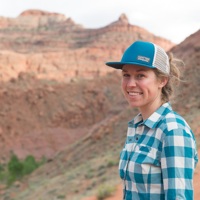“Is running selfish? I don’t know about having a coaching business—how much value does it have?” said Ali Pottinger, now co-owner of Squadrun, a popular coaching company that she launched with Kerry Suter, also her life partner, four years ago. Over the last few years, the pair has settled into a house in Rotorua, on the North Island of their home country, New Zealand—which is also the location of Tarawera Ultramarathons–as the home base for their life and business. However, the pair is on the move constantly for work and their own adventures, and sometimes they only see home a few days per month.
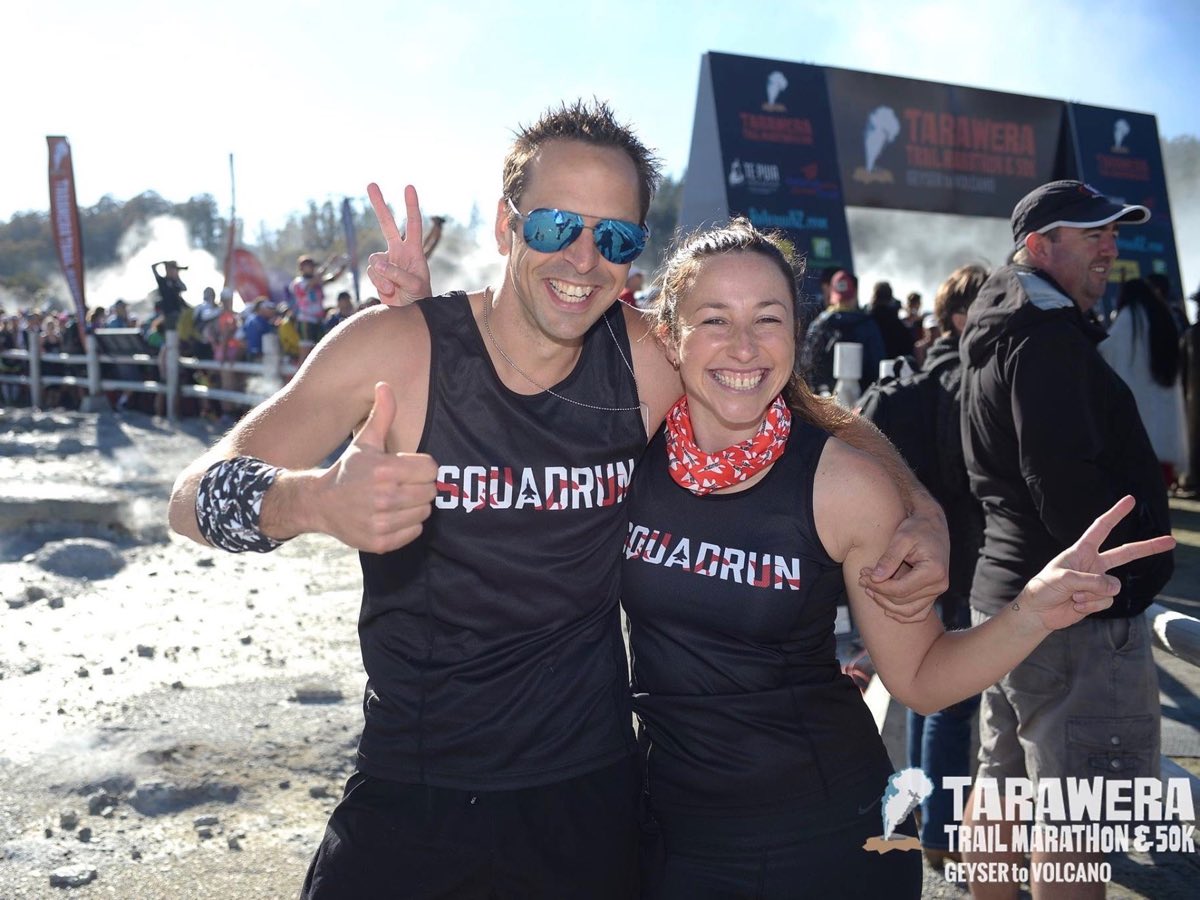
Ali Pottinger and Kerry Suter. Photo: Photos4sale
Before Pottinger committed to the professional shift, she asked a lot of tough questions. She was about to leave a long-time teaching career. She’d earned a Bachelor of Education degree, and for a decade, taught early childhood education with a focus on five year olds. She loved a role in a field that clearly impacts individual growth and can ripple into society.
“The more I coached, I realized that we are still malleable as adults, physically and mentally. It’s so cool to see people benefit so much from training, racing, and this community,” said Pottinger.
Suter and Pottinger rapidly dove into co-creating the business in 2015, a few months after they met at a popular event called the T42, in New Zealand. “It’s a race that’s renowned for being a fun weekend away with a great after party,” said Pottinger. Suter ran the 42k traverse and took his third consecutive win that year. That event played great part in the genesis of Squadrun.
“I bumped into this girl on the dance floor, and she started making fun of me. I enjoyed that intellect. She was sharp, clever, and funny. I knew one day she might stop making fun of me,” says Suter, satirically, about their first encounter—to which, Pottinger laughs. Suter adds that he boldly introduced himself to her as, “the guy at the top of the results list, on the wall.”
To which, Pottinger wittingly responded, “I haven’t read it and don’t know who you are.”
“I think you’ll find I’m quite a big deal,” he retorted.
“No, you’re not. Nobody is better than anyone else,” she said.
The duo recounts this fond memory to me over our Skype call, and their banter is full of adoration. “I quite often jokingly laugh about how awesome and good looking I am, and Ali can chop me down and make fun of me. From a personality standpoint, I enjoy that rapport. We always have a good laugh,” said Suter.
The couple’s strong yin-yang balance, their complimentary personalities, and their diverse perspectives seem to be fundamental to their success as partners and co-coaches. At their most recent trail running camp, Suter led the group called ‘Need for Speed,’ while Pottinger’s group named itself ‘Trucker Bros.’ They label themselves ‘good cop, bad cop.’ As a team, they offer a performance-and-wellness mix to running.
“If you need support, talk to Ali. If you need a kick up the butt, talk to Kerry,” said Ngaire O’Leary, an ultrarunner and audio-visual consultant based in Sydney, Australia who has worked with Squadrun since its 2015 inauguration. Together, “they [support] the idea that everything is possible, if you are prepared to do the work. And they contribute hugely to our trail and ultra community by making races accessible to as many runners as possible,” said O’Leary.
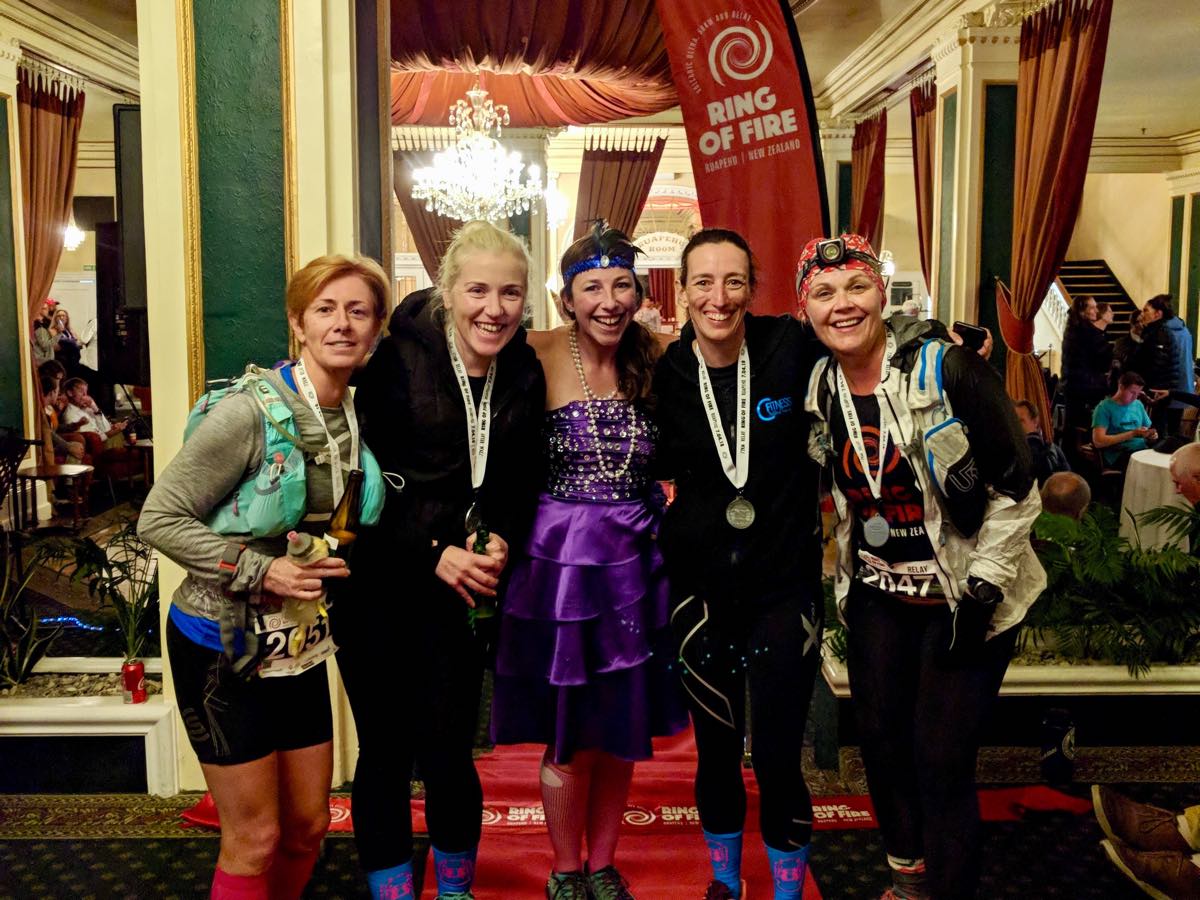
Ali (middle, in purple) dressed up to welcome people into the finish line at the Ring of Fire race in New Zealand. It was a glam runners ball theme. Photo: Kerry Suter
Now, in a short time span, Squadrun has helped close to 3,000 runners reach their race goals. The origins of most Squadrun runners include Singapore, Australia, New Zealand, the United Kingdom, and the United States, as well as military placements in Afghanistan and Korea. Throughout the year, the duo coaches at least 250 individuals at any given time, and that number swells to 500 during the Tarawera Ultramarathons. Based on such figures, the demand for coaches among trail runners is apparent. And Squadrun’s primary mission is to help as many athletes as possible.
“I found that my athletic ambition turned to helping others, and that’s been the last four years of growth. I love the relationship that I have with running now. Instead of worrying about my own race-day results, it’s the experience of 200 to 300 other athletes that I focus on. [I] get a lot more satisfaction,” said Suter, who started coaching a handful of athletes for the Tarawera Ultramarathons. The race was hosting introductory evenings for folks who were considering signing up for the race. “There was a big room full of people, and I thought, A lot of people want help. Is there a way I can work with more people and help them?” said Suter.
He found a solution. The pivotal reason that Squadrun can scale its services to reach more runners than a typical coach is a software program that Suter developed. Suter’s former career was as an information-technology (IT) professional at Hewlett-Packard. As a self-proclaimed “IT nerd,” he created an online platform that inputs an athlete’s personal information—such as their fitness level and training capacity—alongside the event specifics like elevation and distance, to yield a tailored training plan.
“During a sleepless week, I had a ‘beautiful mind’ session with a spreadsheet. I realized that the constant was the event, and that the variables were the athlete’s fitness (training speed) and their ability to absorb training (weekly mileage and training frequency). I turned the spreadsheet into a database,” said Suter. “I could write a detailed program for events, once I knew enough, and then plug athletes into the system. The basics of training for a specific race is effectively the same for everyone, but how much a runner can do and how fast a runner can do it is what makes everyone’s program unique,” said Suter.
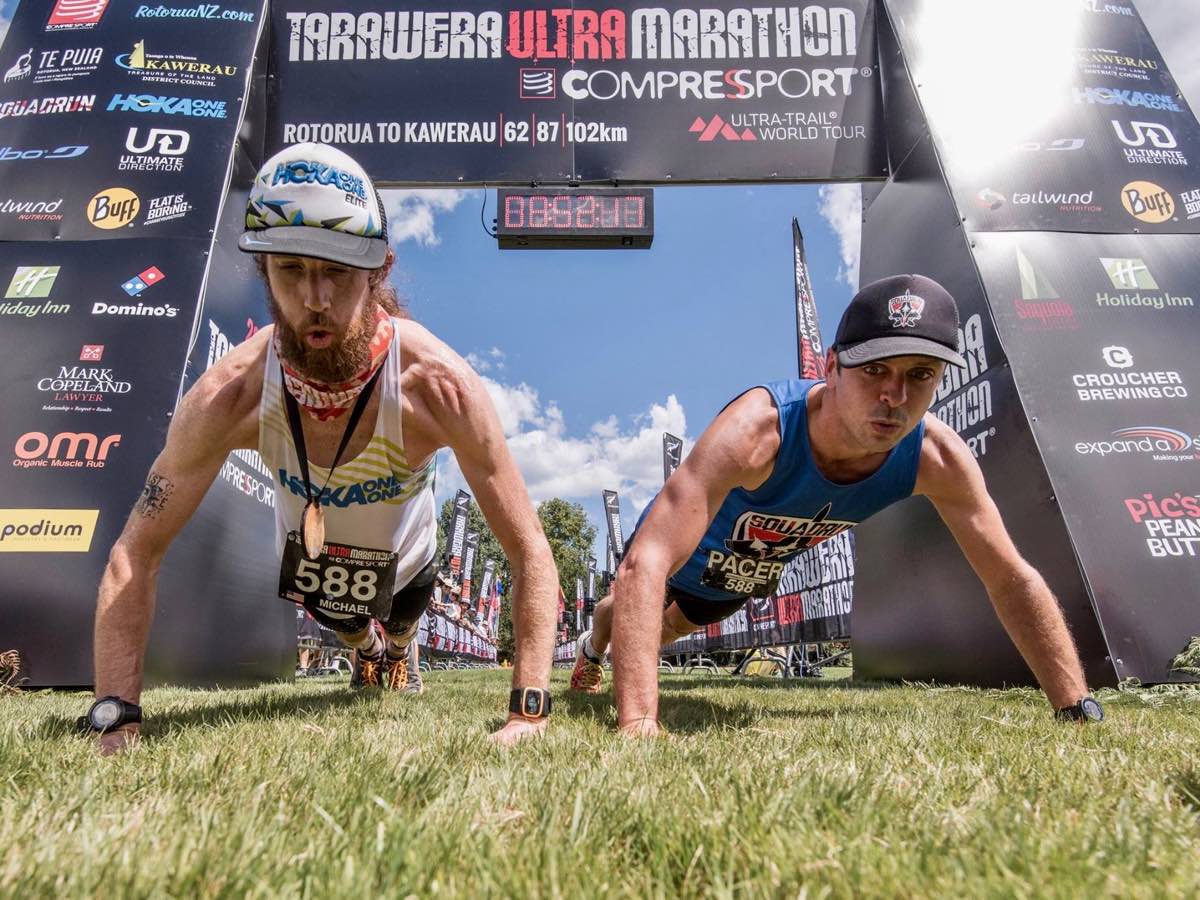
Kerry and Michael Wardian doing push-ups after Kerry paced Mike at the 2017 Tarawera 100k. Photo: Kurt Matthews Photography
But “running can be solitary sport,” said Pottinger. So, when she and Suter started brainstorming their coaching philosophy, she proposed a holistic approach. “I said to Kerry, ‘If we want this to work really well, let’s get people interacting with each other and bring people together. It will provide a lot more benefits to their running.”
To that success, Squadrun hosts Facebook groups, sets up team tents at events, and operates an interactive map with ‘where are we?’ flags for athletes to connect. There’s team-branded apparel. And they host four training camps per year at different race sites: where the Ultra-Trail Australia takes place in the country’s Blue Mountains; where the Old Ghost Ultra runs on the west coast of New Zealand’s South Island; and around Rotorua for the Tarawera Ultramarathons.
“I love providing introductions to our runners via email or Facebook. We organize group dinners if we go to an area to visit, so we can catch up. And people often organize ‘Squaddie’ group runs for likeminded runners in their own area,” explained Pottinger.
“What Kerry and Ali have done is create a community of trail runners in New Zealand and Australia that are incredibly supportive of each other in their trail running journey. The group ranges from absolute beginners to runners that would hit the podium in any major trail race,” said Paul Charteris, founder of the Tarawera Ultramarathons. He continued, “The genius of Squadrun is that their online communities inform, motivate, and inspire many runners to connect with each other, seek advice, and learn from others. There are plenty of other trail running online groups around, but the ‘Squaddies’ seem to have a special cohesiveness, mainly due to Ali and Kerry’s energy and personalities.”
As such, Squadrun’s guidance goes beyond mileage and effort. Perhaps, the most significant aspect of Suter and Pottinger’s methodology is that they partner with specific events in Australasia to offer integrated instruction that bears benefits for the race organizers, runners, and their own business. Their coaching is tailored to the race’s timing, the amount of preparation that athletes need and want, and the specific conditions of that year’s event. And they connect all of the people who are training for the same race with each other to create a supportive, fun community.
Furthermore, as Suter and Pottinger spend more time on the courses, their council and training camps become increasingly more specialized. Come race day, they’re hands-on—for instance, they set up course markings or work as finish-line announcers—in addition to supporting Squadrun athletes.
“The finish rate of our athletes is 98% at the Ultra-Trail Australia—and the race’s drop rate is typically 25 to 27%. So, you’re 10 times more likely to finish if you’ve been coached by us. We offer good event direction and we care about the athletes,” said Suter, who prescribes to a periodization training model.
Squadrun started coaching via a few races in 2015. That October, nearly 100 runners signed up—in a single day—to be coached for Ultra-Trail Australia.
“We realized, if we want to do justice with our work, we’d need to go over to Australia [from New Zealand] and work directly with people,” said Pottinger. That’s when they hit the road to get their freshly crafted career up and running where Ultra-Trail Australia takes place.
“We lived out of backpacks for a year and mooched around places. It seems like a big number of [runners] might equal big money, but we were new running coaches with a weird approach to training. It was challenging and has been since,” said Suter. “Coaching has been around as long as the sport but the structure of which was typically akin to someone meeting you at the track with a whistle and clipboard. Taking coaching to an online environment meant a departure from the rigid structure of geography and a significant reduction in cost,” he explained.
Pottinger and Suter both grew up in New Zealand. Pottinger is from Masterton, a little town that draws upon the big farming country with mountain ranges not far off. Suter grew up in Cambridge, a horse-and-dairy town with surrounding fields of green grass and lots of roads for road running.
Suter initially started running for his health. “I didn’t start running until I was 29 years old. I was a chubby IT guy who decided I needed to do something. I researched what was the least amount of time to get a result. Running came up as the most efficient way to lose weight. I thought, I only need to do 30 minutes of this, and it seemed easy. By the time I was 32 years old, I was running all the time. I became obsessed,” said Suter.
With consistency and patience, he became competitive. Among his accomplishments, he has won the Tarawera Ultramarathons twice, including the inaugural event in 2009, which was a 50 miler back then.
“I was surrounded by a lot of skilled runners and coaches that’d been doing this for decades,” he said. “I thought I’d give the first Tarawera a nudge. I remember racing another very capable runner and thinking, Maybe this isn’t sustainable for 85k. But it was. I think I finished in about seven hours,” recalled Suter. Over the years, he continued to win and set course records at numerous events.
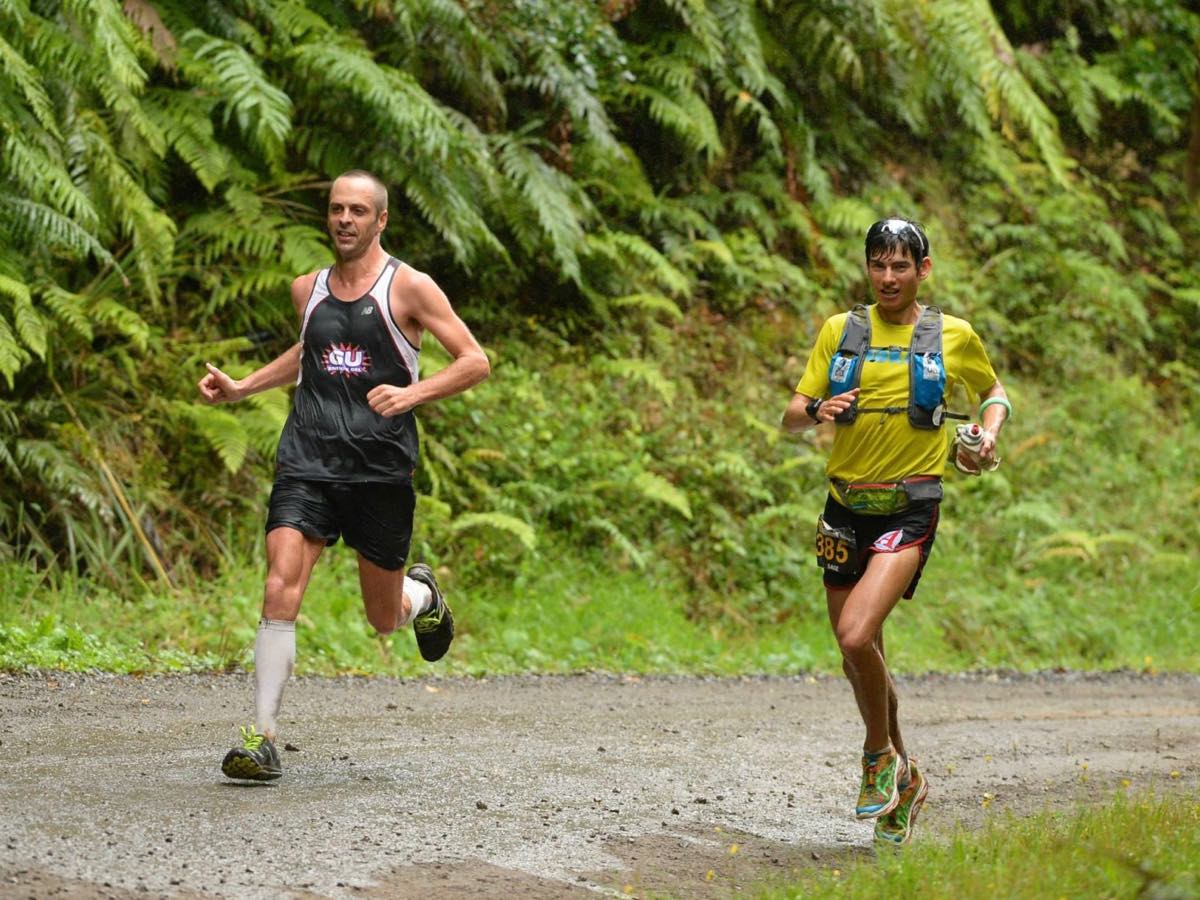
Kerry pacing Sage Canaday at the 2014 Tarawera 100k. Photo: Photos4sale
Pottinger grew up playing sports, including cricket, which motivated her to run as a means for better fitness. As a young adult, she lived for 7.5 years in London, England, where she ran five times per week on the roads to explore the city. But she always missed the trails back home in New Zealand, where she used to do training runs in Tararua Forest Park, as a teen. Her first ultramarathon was a 55k relay for the Great Ocean Walk 100k in 2016.
As with any small business, steering Squadrun hasn’t been without obstacles. There are minimal to no professional development tracks in Australasia that can aid their professional development as coaches, compared to the U.S., which has the USA Track and Field, notes Pottinger. Their calendar is constantly full and the email inbox is at times overwhelming.
“There are a lot of pots on the boil. Maybe we need to turn some off,” said Suter. “You have to find the balance where your business isn’t stopping you from doing what you want to do. No athlete or person with a love for the wilderness wants to spend 14 hours a day in front of a laptop,” he said and expressed a desire to spend more time hiking and relaxing with Pottinger.
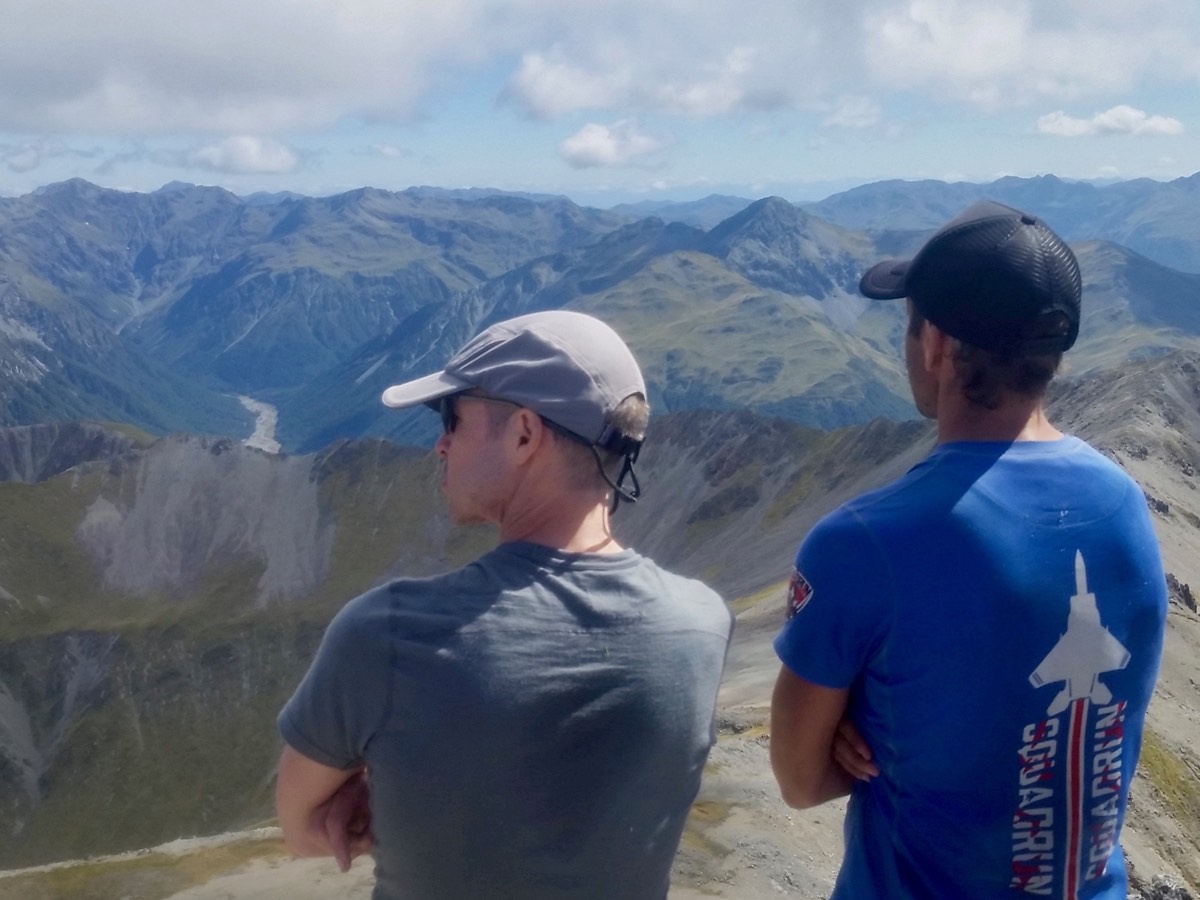
Kerry (right) with his brother Nick Suter on a backpacking trip in New Zealand. The pair adventures regularly together. Photo courtesy of Kerry Suter.
Both of them are individually ambitious. One of Suter’s recent adventures was running 100 miles self-supported through New Zealand’s mountains to recreate a classic route from a piece of local, historical fiction. The book Man Alone by John Mulgan shares the story of a 1920s fugitive who flees the scene of an accidental homicide. The adventure was full of off-trail canyons and ridgelines requiring self-navigation. Suter’s recreation of the route took five days to complete due to brutal weather–he was stuck in huts for a couple days waiting for the weather to calm enough to cross exposed terrain.
“I loved it. It kicked my ass and challenged me to be on my own. [I did it] for self-exploration. And the sport has afforded me the fitness to do more extreme stuff like this,” said Suter. The scariest challenge he faced during his Man Alone mission was accidentally eating a 17-year-old chicken casserole out of an army-ration pack he found in a hut. “I started to worry about the contents of my stomach. But I survived and eating that was the scariest challenge,” he said. One day, he’d like to tackle a project like Nolan’s 14 in Colorado.
Pottinger is likewise drawn to personal exploration, One of her recent adventures was a five-day run trip with friends to combine three classic treks: the Rakiura Track on Stewart Island (which is 32k long and has 1,400 meters of gain), the Milford Track (53k and 1,500 meters of gain), and the Routeburn Track (33k and 1,300 meters of gain). Connecting the three tracks back-to-back required more than 15 hours of travel by vehicle and boat, excluding the flights to Queenstown, where the group started and finished their circuit. Looking ahead, Pottinger also has it on her list to complete all of New Zealand’s Great Walks. The hope is for Squadrun to embody that spirit of exploration, too.
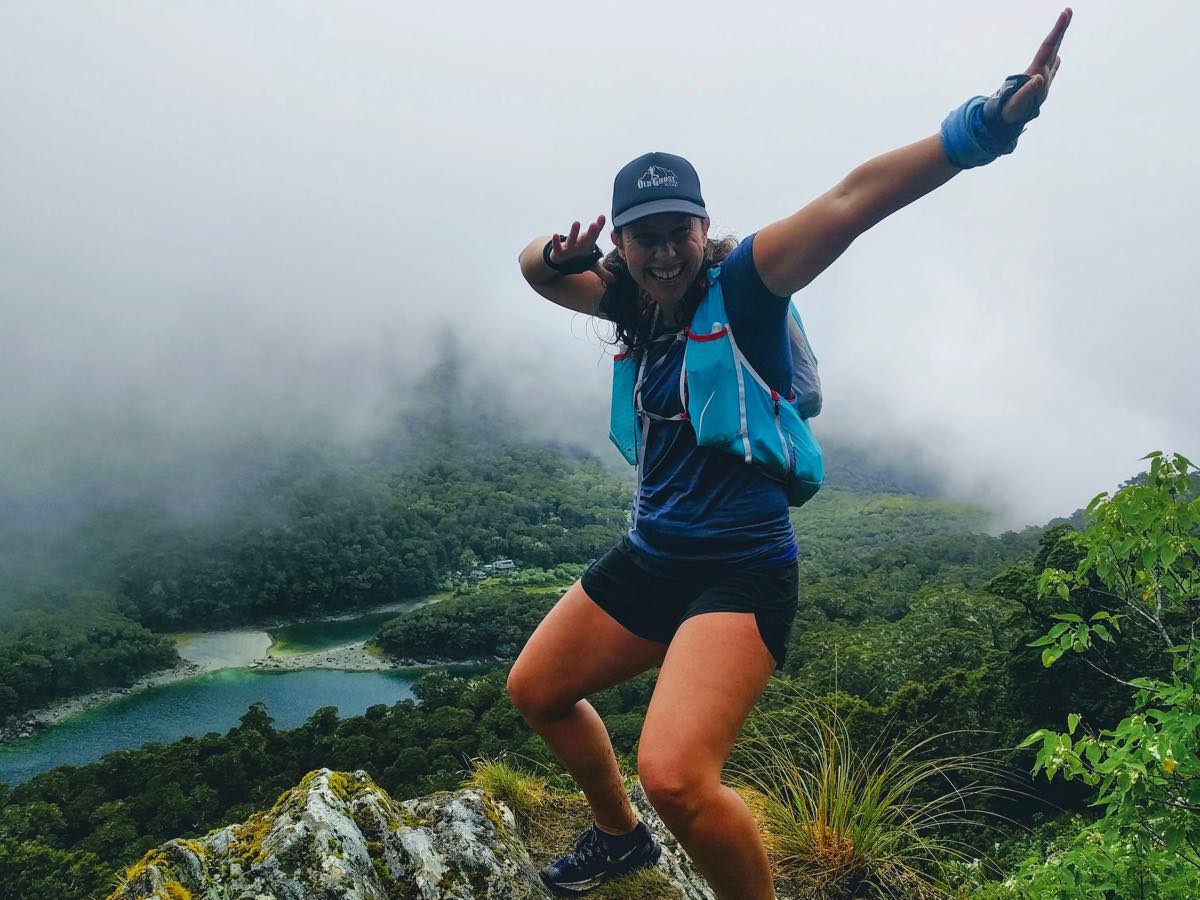
Ali on the Routeburn Track, while running three of New Zealand’s Great Walks in five days with friends. Photo: Maree Holgate
“The underpinning of our coaching is to have adventures and fun. It’s important for people to explore nature and conserve it. And we want to bring people together. Ultras, especially on race day, can be daunting. It’s so nice for people to have someone they recognize from their trail family. We’ve got an amazing community,” said Pottinger.
Ultimately, the personal inspirations of Pottinger and Suter equally feed into a multi-faceted coaching ethos that benefits a countless number of others.
“Ali and Kerry completely embody the idea that the most important thing is people. They have built a community of amazing people around them. I am, personally, very proud to be part of a group that constantly supports and encourages each other and cheers each other’s victories—and that is very much due to Kerry and Ali’s leadership,” said O’Leary.
Call for Comments (from Meghan)
- Are you a member of Squadrun? Can you share some stories about your experience in the group?
- Have you run a race or done an adventure when Ali Pottinger and/or Kerry Suter have been around? Leave a comment to share a story!
